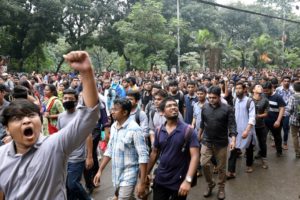By Pulack Ghatack on Aug 10, 2018 07:30 pm
Bangladeshi police have arrested at least 42 people in connection with recent mass protests demanding road safety, officials said Friday, amid growing international calls for the release of those detained, including renowned photographer Shahidul Alam.
Law enforcement officials said they were on the lookout for “instigators” of demonstrations that brought tens of thousands of mostly high school students to the streets for nine days after two classmates were killed by a speeding bus in late July.
“We are watching the agitators and instigators,” Lt. Col. Sarwar Bin Quashem, an official of the elite Rapid Action Battalion police force (RAB), told BenarNews. “We’re monitoring people who were involved in spreading false propaganda and rumour using social sites.”
The comments sparked panic among students, some of whom have gone into hiding, according to young people who spoke to BenarNews on condition of anonymity.
Among those detained are 22 private university students who were put on remand for two-day interrogation in police custody, sources told BenarNews.
“Police did not arrest minors,” said Iqbal Sobhan Chowdhury, Prime Minister Sheikh Hasina’s adviser for media. “Lawful actions are being taken only against the adults, who were involved in provocation and anarchy out of political motives.”
Bangladesh’s Education Minister Nurul Islam Nahid earlier rejected an appeal from university vice-chancellors to announce a general amnesty for student protesters.
‘Who are we to forgive anyone? We cannot spare anyone who spread rumours,” he said. “Law will take its own course. We cannot say that the culprits will not face legal action.”
‘Absurd charges’
The comments came as international rights and media groups slammed Bangladesh for the brutal beatings of journalists covering the protests and suppression of free speech.
“No arrests have so far been made in connection with the violence against many journalists that took place on Aug. 5,” Reporters Without Borders (RSF) said a statement titled “Shocking press freedom violations during Bangladesh student protests.”
Up to 26 journalists covering the events suffered injuries on Aug. 4 – 5, according to a BenarNews tally. Among them was AP news photographer AM Ahad. Social media videos of Ahad’s attack showed about a dozen men striking him with long sticks and batons.
“It is high time that the Bangladeshi authorities took concrete measures to defuse the tension and demonstrate respect for press freedom and democratic practices,” said Daniel Bastard, head of RSF’s Asia-Pacific desk.
“The first step should be to drop the absurd charges against Shahidul Alam and to arrest those responsible for the deliberate violence against journalists,” he said.
Alam, a respected figure in the photojournalism community, was seized by dozens of police officers in civilian clothes from his home on Aug. 5, according to his partner, Rahnuma Ahmed.
A Dhaka court ordered him held for seven days for questioning on allegations that he violated the country’s Information and Communication Technology Act by spreading propaganda against the government and false information on electronic media.
Alam was arrested hours after an interview with Al-Jazeera in which he said the Hasina government was clinging on to power by using “brute force,” and after posting live updates on the student protests on Facebook in which he gave tallies of those reportedly injured.
In a joint statement Friday, 24 more human rights and media groups called for Alam’s “immediate and unconditional release” and demanded that “all allegations against him be dropped as they represent a blatant violation of his right to freedom of expression.”
As police escorted the barefooted Alam to court Monday, he yelled at reporters that he had been beaten by police.
“They washed my blood-stained tunic and then I was made to wear it again,” Alam said. “I urge the citizens of the country to protest. I have been told that if I don’t obey their instructions they will hurt me more.”
Sajeeb Wazed, the son of Prime Minister Sheikh Hasina and “government information technology adviser, claimed the statement was baseless.
“Contrary to recent media reports, no evidence exists that Bangladeshi photographer Shahidul Alam was tortured while in police custody,” he said in a statement Friday.
“Unfortunately, in an election year, opposition party leaders are prone to exaggerate and even fabricate issues in an attempt to influence public opinion. The opposition Bangladesh Nationalist Party and its leaders are no doubt doing so with Mr. Alam’s story.” Bangladesh is scheduled to hold national elections in December.
‘A legitimate right’
The demonstrations brought streets of the capital to a standstill and saw students stopping vehicles of police and government officials, demanding to see licenses and registrations.
Violent confrontation broke out after six days, as police and men allegedly linked with the ruling party swooped in and chased the demonstrators with long sticks. Scores were hurt as police fired tear gas, beat up students and blasted them with water cannons.
Amid the chaos, armed adult men attacked U.S. Ambassador Marcia Bernicat’s vehicle, although no one was harmed, the U.S. Embassy in Dhaka said.
A Facebook post by the U.S. embassy declared that the protests “have united and captured the imagination of the whole country,” while UNICEF, the United Nation’s children agency, defended the students in a tweet.
“Students and young people have a legitimate right to speak out on issues of concern to them, including road safety issues and to have their opinion heard without the threat of violence,” UNICEF Bangladesh said.

